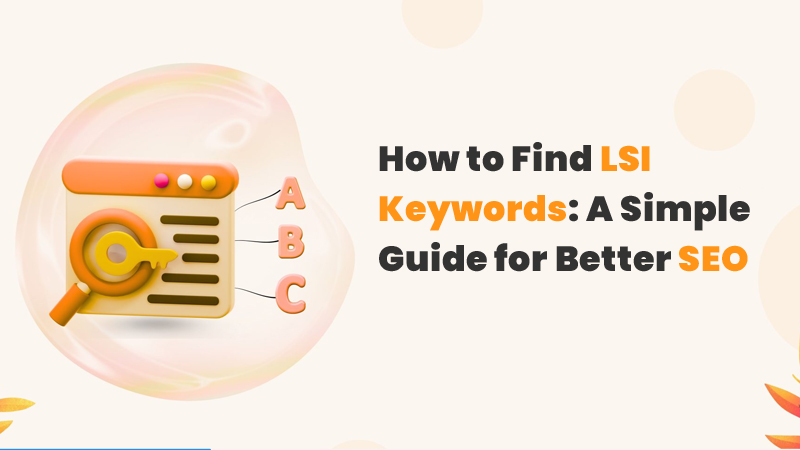Keywords are the foundation of visibility in the field of search engine optimization (SEO). However, the way search engines understand content is also evolving. The days of cramming exact-match keywords into each paragraph are over. These days, context is important, which is where LSI keywords are useful.
This blog is your one-stop resource if you’ve ever wondered what LSI keywords are, what they mean in SEO, or how to locate and apply them efficiently. We’ll explore the meaning of LSI keywords, their role in SEO, examples, and practical ways to discover and use them.
What Are LSI Keywords?
Latent Semantic Indexing, or LSI for short, is a natural language processing concept. Words and phrases that are semantically similar to your primary keyword are known as LSI keywords in SEO. They aid search engines in comprehending your content’s context.
If your primary keyword is “apple,” for instance, LSI keywords can assist you make it clear whether you’re referring to the food, the tech firm, or even a color.
LSI Keywords Meaning in SEO
LSI keywords are more than just synonyms in SEO. They are supporting contextual cues for your main keyword. They assist search engines like Google in figuring out the true purpose of your page. Assume that the topic of your paper is “digital marketing.” LSI keywords could consist of:
- SEO
- PPC
- Content strategy
- Email campaigns
- Analytics
These terms show that your content is part of a broader topic, making it easier for search engines to rank it accurately.
LSI Keywords Examples
Here are a few examples to illustrate how LSI keywords work:
| Main Keyword | LSI Keywords |
| Coffee | espresso, caffeine, brew, beans, cafe |
| Laptop | notebook, processor, RAM, SSD, screen |
| Yoga | meditation, flexibility, poses, breathing, mat |
| Travel | itinerary, flights, hotels, passport, adventure |
Why LSI Keywords Matter for SEO?
Using LSI keywords in your content offers several benefits:
- Improves relevance: Helps search engines understand your topic better.
- Avoids keyword stuffing: You don’t need to repeat the same keyword endlessly.
- Boosts rankings: Pages with rich context tend to rank higher.
- Enhances user experience: Content feels more natural and informative.
How to Find LSI Keywords? (Step-by-Step)
You don’t need expensive software to find LSI keywords. Here are simple, manual methods and free tools you can use:
Google Autocomplete
Start typing your main keyword into Google’s search bar. The suggestions that pop up are often LSI keywords.
Example: Type “digital marketing” and you might see:
- digital marketing strategy
- digital marketing tools
- digital marketing jobs
Google Snippet Bold Terms
Look at the bolded words in Google’s meta descriptions and featured snippets. These often include semantically related terms that Google associates with your query.
Google’s “Related Searches”
Scroll to the bottom of the search results page. You’ll find a list of related searches—these are gold for LSI keyword ideas.
Example: Searching “SEO tools” might show:
- Best SEO software
- Keyword research tools
- Backlink checker
Wikipedia
Search your topic on Wikipedia. The table of contents and internal links often contain semantically related terms.
Example: For “nutrition,” you might find:
- Macronutrients
- Vitamins
- Dietary fiber
- Metabolism
Competitor Analysis
Look at top-ranking articles for your keyword. Scan their headings, subheadings, and bolded terms. These often include LSI keywords.
Manual Brainstorming
Think about what words naturally relate to your topic. Ask yourself:
- What tools are used?
- What problems are solved?
- What industries are involved?
Write down everything that comes to your mind.
Where to Use LSI Keywords in Your Content?
Once you’ve gathered your LSI keywords, use them strategically:
- Title tag: Include one or two related terms.
- Meta description: Add context with LSI keywords.
- Headings (H2, H3): Sprinkle them in naturally.
- Body text: Use them where they fit organically.
- Image alt text: Describe images with relevant terms.
- Anchor text: Link to related pages using LSI keywords.
How LSI Keywords Improve SEO Performance?
Here’s how LSI keywords can impact your content’s performance:
| Benefit | Impact |
| Better context | Higher relevance in search results |
| Richer content | Longer dwell time and lower bounce rate |
| Broader reach | Ranking for more related queries |
| Natural flow | Improved readability and user satisfaction |
Final Thoughts
An effective method of enhancing your SEO without the need for sophisticated technologies is to comprehend and use LSI keywords. You may improve the clarity of your message for both people and search engines by giving your content additional context and depth. To create a more comprehensive and pertinent piece of content, consider the meaning of LSI keywords, look into instances of LSI keywords, and apply them.
FAQs
What Are LSI Keywords?
LSI keywords (Latent Semantic Indexing keywords) are words and phrases that are related to a main keyword. They help search engines understand the context of your content, improving relevance and ranking.
Are LSI Keywords Just Synonyms?
No, LSI keywords are not limited to synonyms. They include: Related concepts, Industry-specific terms, and Commonly associated phrases.
Do LSI Keywords Improve SEO?
Yes, LSI Keywords improve SEO via various ways, such as Improve semantic relevance, Increase chances of appearing in featured snippets, and Enhance user experience by making content more natural.
Where Should I Use LSI Keywords?
You can use LSI Keywords in Title tags, Meta descriptions, Headings (H2, H3), Body content, Image alt text, and Anchor text for internal links.
Does Google Use LSI Technology?
Google does not use LSI in its algorithm. However, it does use semantic analysis, machine learning, and natural language processing to understand content relationships—similar to what LSI aims to achieve.
